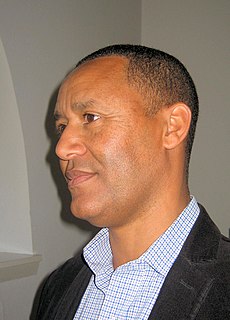A Quote by Yuval Noah Harari
When the first humans reached Australia about 45,000 years ago, they quickly drove to extinction 90% of its large animals. This was the first significant impact that Homo sapiens had on the planet's ecosystem. It was not the last.
Related Quotes
The humanity and the humility, which are very different than the biological species homo sapiens. Humanity versus homo sapiens - very different things. We are biological creatures, we are animals, no doubt, but when you talk about "humando," you're talking about that particular kind of animals who are aware of their impending extinction, who have the capacity to be sensitive to catastrophe and disaster and calamity and profound crisis.
A few years ago, they [Neandertals] were thought to be ancestral to anatomically modern humans, but now we know that modern humans appeared at least 100,000 years ago, much before the disappearance of the Neandertals. Moreover, in caves in the Middle East, fossils of modern humans have been found dated 120,000-100,000 years ago, as well as Neandertals dated at 60,000 and 70,000 years ago, followed again by modern humans dated at 40,000 years ago. It is unclear whether the two forms repeatedly replaced one another by migration from other regions, or whether they coexisted in some areas
A billion homo sapiens are added every 11 years to the planet. The hypertrophy of a single species pushes other life-forms out of bed and into extinction. The decline of biological diversity is real and severe. The alarming loss of soil fertility, forest cover, and coral reef viability and the release of fossilized CO2 that nature put away 300 million years ago in its march toward greater diversity - all these "losses" and many others are the result of one life-form annihilating other life-forms in its immoral confusion of "dominion" with "domination."
I learned that the first technology appeared in the form of stone tools, 2.6 million years ago. First entertainment comes evidence from flutes that are 35,000 years old. And evidence for first design comes 75,000 years old - beads. And you can do the same with your genes and track them back in time.
Consider this: all the ants on the planet, taken together, have a biomass greater than that of humans. Ants have been incredibly industrious for millions of years. Yet their productiveness nourishes plants, animals, and soil. Human industry has been in full swing for little over a century, yet it has brought about a decline in almost every ecosystem on the planet. Nature doesn't have a design problem. People do.
We have come to look at our planet as a resource for our species, which is funny when you think that the planet has been around for about five billion years, and Homo sapiens for perhaps one hundred thousand. We have acquired an arrogance about ourselves that I find frightening. We have come to feel that we are so far apart from the rest of nature that we have but to command.
My first car was kind of sad. My first car was when my parents had completely worn out their Toyota Corolla that they had for 16 years or something. They gave me, for my 19th birthday, this really ancient Toyota. So that was my first car. And I loved it. I thought it was amazing, and I drove it cross-country. It was not aesthetically appealing in any way. It was it fast. It did not handle well, but it lasted forever. I drove cross-country and back, and then I gave it to my sister, and she drove it for another 10 years.




































